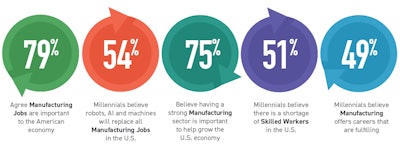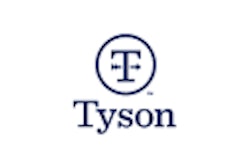Manufacturing companies need to fill an estimated 3.5 million jobs within the next decade, and manufacturers are frantically searching for people to fill them. But when targeting millennials, it’s crucial companies understand this generation’s perception of the industry in order to fill the coming workforce shortage and skills gap, according to a new manufacturing study.
The Manufacturing Index survey conducted by Leading2Lean, a software supplier, annually measures and reports on the public’s perception of U.S. manufacturing industry. This year’s study revealed millennials are unaware of the manufacturing workforce shortage and the importance of these jobs to the economy when compared to baby boomers and Generation X.
“We are seeing some of the highest demand for skilled manufacturing jobs in recent history, yet it seems the industry has failed to keep younger generations informed about the skills gap or availability of great jobs,” says Keith Barr, CEO and president of Leading2Lean.
It’ll be an uphill battle filling these jobs because less than half of millennials surveyed believe manufacturing can offer fulfilling careers. And, only 51 percent of people believe there is a shortage of skilled workers. Part of this mindset could exist because millennials don’t realize these jobs offer competitive salaries and advancement opportunities, according to the survey.
“Jobs in the industry involve complex problem solving and interesting technology,” Barr says. “They’re not mind-numbing jobs that take place at dilapidated factories.”
But there seems to be a disconnect because 54 percent of millennials surveyed said robots, artificial intelligence and machines are replacing these jobs. However, they aren’t the only ones. Around 70 percent of people polled said American manufacturing is declining, and 58 percent of people believe the actual number of jobs is declining.
“We see from this data that we need to do better as an industry to show the younger generation how the industry has changed,” Barr says.
Despite this notion, these jobs should be valued not only because of their complex nature but also because of their effect on the economy. Almost 80 percent of people said these jobs are important to the American economy. And 75 percent said they’re needed to drive economic growth.
It’s necessary for companies to understand these varied mindsets moving forward when trying to address the workforce shortage, otherwise, it’s likely little progress will be made, according to Barr.























